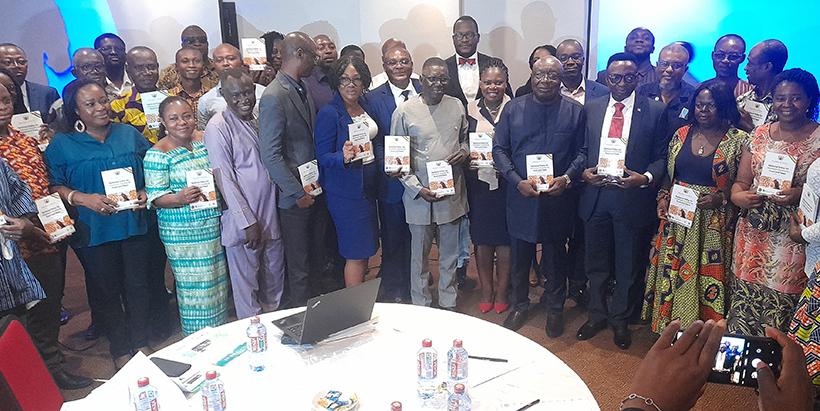October 21, 2022
21 October 2022
Ghana is on the path to overcoming issues related to aflatoxin contamination in food and feed—maize, groundnut, sorghum, and derived products—by launching a landmark National Policy for Aflatoxin Control in Food and Feed. The Aflatoxin Policy, launched in Accra on 12 October, provides a coordinated approach among institutions and stakeholders to control aflatoxin in foods and feeds to reduce foodborne diseases. A successful implementation would also increase the income of farmers and agricultural stakeholders and promote food security and food safety in keeping with Goal 2 of the Sustainable Development Goals (SDGs)—Achieve Zero Hunger by 2030.
 The Minister for Environment, Science, Technology and Innovation, Dr Kwaku Afriyie (front row, sixth from right), with other public and private sector stakeholders showcasing the National Aflatoxin Policy document at the launch event in Accra.
The Minister for Environment, Science, Technology and Innovation, Dr Kwaku Afriyie (front row, sixth from right), with other public and private sector stakeholders showcasing the National Aflatoxin Policy document at the launch event in Accra.
Ghana’s Minister for Environment, Science, Technology and Innovation (MESTI), Dr Kwaku Afriyie, lauded the effort of the Science and Technology Policy Research Institute of Ghana’s Council for Scientific and Industrial Research (CSIR-STEPRI) for their leading role in developing the policy. Afriyie emphasized that aflatoxin contamination in crops has serious implications for food security, health, trade, and livelihoods. He noted how aflatoxin might be linked to increased liver cancer cases in Ghana (21% of all recorded cancer cases in Ghana).
Afriyie elaborated on how aflatoxins pose a barrier to trade and market development due to the rejection of contaminated products by local and international buyers. In the early 2000s, the European Union (EU) was the main destination for Ghana’s groundnut and maize products; however, only 10% of the exported peanut butter met the stringent EU standards in 2019. The Minister, therefore, acknowledged that the policy aligns with the Government’s Coordinated Programme of Economic and Social Development Policies (2017-2024), which recognizes challenges in agriculture, nutrition, and health and makes provisions for addressing them. When implemented, he said, it would boost the success of the government’s flagship programs, including Planting for Food and Jobs, Planting for Exports and Rural Development, Rearing for Food and Jobs, and One District One Factory.
In his speech, the Minister of Food and Agriculture (MoFA), Dr Owusu Afriyie Akoto, also recognized the immense adverse effects of aflatoxin contamination. He indicated that MoFA, through the Plant Protection and Regulatory Services Directorate (PPRSD), has developed codes of practice for preventing, reducing, and eliminating aflatoxin contamination in maize and groundnut in the country.
Long-time IITA collaborator and Chairman of the National Steering Committee for Aflatoxin Control, Professor Richard T. Awuah, appealed to the Government of Ghana through MoFA to adopt Aflasafe GH01 and Aflasafe GH02. These aflatoxin biocontrol products were developed specifically for Ghana through painstaking research by IITA, in collaboration with the Kwame Nkrumah University of Science and Technology (KNUST) and the US Department of Agriculture-Agricultural Research Service (USDA-ARS). He said studies have shown that, apart from its high effectiveness in maize and groundnut, farmers who used Aflasafe to cultivate sorghum in the Northern Region produced aflatoxin-safe sorghum.
“This is probably the most important way we can minimize aflatoxin contamination of our feed and food in Ghana. We have tried drying, early planting, early harvesting, and proper storage. These are good, but they don’t amount to much. It is the Aflasafe, which is going to do the trick,” Prof. Awuah said. He added: “If the Government helps make Aflasafe available to farmers, it will help a lot in mitigating aflatoxin contamination of our foods.” Aflasafe distribution rights in Ghana have been licensed to CalliGhana, a UPL subsidiary.
A significant aspect of the policy is that CSIR-STEPRI used the Prioritizing Investments for Market Access (P-IMA) framework in collaboration with AGRA and the support of the Standards and Trade Development Facility (STDF) to harness the power of strong public‒private dialogue, economic data, and evidence for prioritizing investments related to aflatoxin control. Further, various activities identified were ranked into five main investment options in the Aflatoxin Policy’s implementation plan to bring the policy’s vision to life:
- Consolidating institutional capacity to ensure successful implementation of the policy
- Increasing public awareness, advocacy, communication, and demand for aflatoxin-safe food and feed
- Strengthening research and technology transfer on aflatoxin
- Enhancing surveillance systems for the detection of aflatoxin-related diseases in humans, livestock, and fish
- Strengthening the capacity of value chain actors in pre- and post-harvest aflatoxin management for market access.
The goal for implementing activities under these investment options is to strengthen consumer protection while increasing market access for domestic and international trade in aflatoxin-safe food products for increased income of value chain actors. MoFA, MESTI, the Ministry of Health (MoH), and the Ministry of Trade and Industry (MoTI) have been tasked to lead the implementation of activities within their respective mandates.